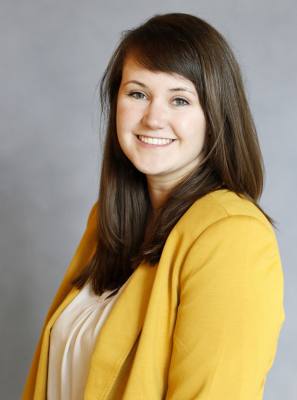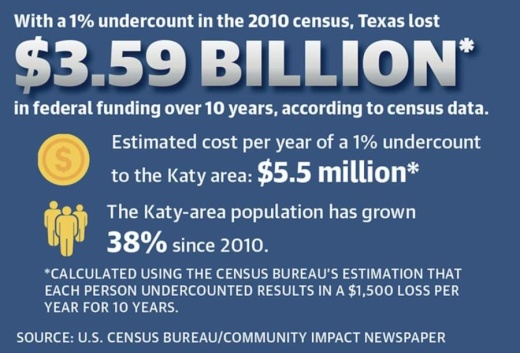“All of our partners have been spending a long time trying to figure out how we make that really big push to our particular communities to respond to the census,” said Nabila Mansoor, who co-chairs the Harris County/Houston Complete Count Committee, a collaborative effort of city and county officials, community leaders and nonprofits dedicated to ensuring a complete count in Houston and Harris County.
Texas is the third-largest recipient of federal funding based on census data, according to the Texas Demographic Center. An undercount of Texas’ 2020 population by 1% could result in an annual $300 million loss in federal funds, according to the center.
This makes a complete count of the population for the 2020 census a priority for the Katy area, which includes Fort Bend, Harris and Waller counties, officials said. As of April 25 data, the Katy-area response rates range from 30%-73.8%, depending on the census tract.
The census is a constitutionally mandated survey taken every 10 years to count each person where they live on April 1, said Douglas Loveday, senior media specialist for the U.S. Census Bureau. The distributed census is confidential and anonymous.
The results are then used to determine federal funding allocation decisions government representatives make at the federal and local levels, all of which could affect residents, Loveday said.
“Billions of dollars in federal funding goes to hospitals, fire departments, schools, roads and other resources,” said Brandee Tiemann, chair of the 2020 Waller County census committee. “Communities lose federal funding for each person not counted. We need everyone to count.”
The U.S. Census Bureau reported it undercounted Texans by 239,500 people in the last census. At $1,500 per person per year, an estimate from the bureau, the state lost billions in federal funding that goes toward programs such as subsidized school lunches, student and housing loans, and infrastructure and transportation projects, Loveday said.
To ensure they do not lose out on this funding, Katy-area counties are spending funds to ensure every person is counted.
The Harris County Commissioners Court approved a $4 million budget for 2020 census outreach, and Fort Bend County commissioners approved a $414,500 contract to promote a full count of its residents.
Waller County did not spend any funds to ensure a complete count, Tiemann said. The committee used available resources in county offices such as fliers and Facebook posts.
An accurate census count drives local business decisions, Fort Bend County Judge KP George said.
“Businesses use census data to decide where to build factories, offices and stores, and this creates jobs,” George said. “Developers use the census to build new homes and revitalize old neighborhoods.”
With an accurate count, Texas is expected to gain at least three seats in the U.S. House of Representatives, jumping from 36 to 39.
Once the data is approved, the census is dispersed to state governments and used by legislators—primarily the party in power—to determine redistricting.
Some Katy-area residents are at a higher risk of not being counted. Census takers consistently have a difficult time counting immigrants, young children and people who are homeless or disabled, according to the U.S. Census Bureau.
George said this is a priority for Fort Bend County.
“We are especially prioritizing historically ‘hard to count’ communities to ensure we get an accurate count so that folks who live in these areas are no longer underrepresented,” he said.
On April 13, the U.S. Census Bureau announced field operations are suspended and will resume after June 1 because of the coronavirus, and the deadline to complete the count has been pushed from August to October.
In response, Mansoor said advocates have shifted to digital outreach to get a complete count.
“We’re still looking to leverage those trusted relationships,” she said. “We’re just doing it in a different way now.”
Additional reporting by Shawn Arrajj, Emma Freer, Anna Herod, Daniel Houston, Ali Linan and Olivia Lueckemeyer.





